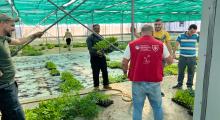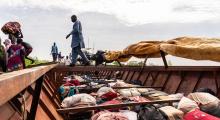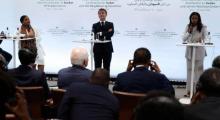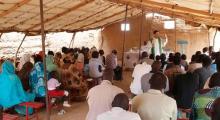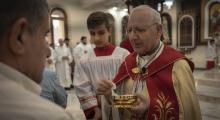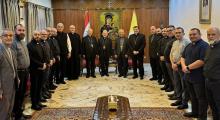Issued by the Catholic Center for Studies and Media - Jordan. Editor-in-chief Fr. Rif'at Bader - موقع أبونا abouna.org
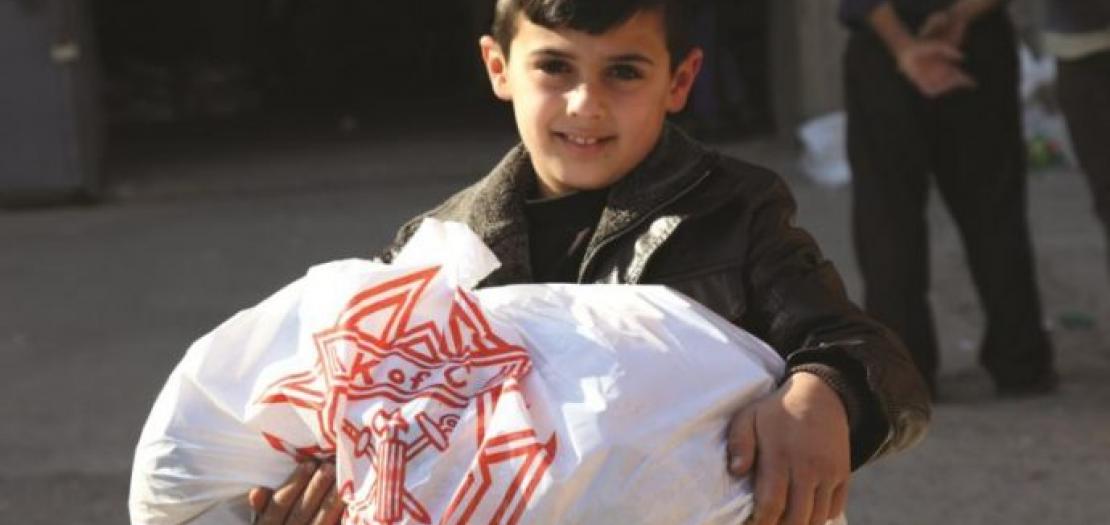
For any nation, no matter where or what the political climate, it’s always young people who hold the future in their hands, determining the course the country will take as they navigate the complexities of a rapidly changing global climate.
For Iraqi youth in particular, the past four years have brought far more change and uncertainty than most people will see in a lifetime.
Considering the rise and fall of ISIS and Iraq’s chronic inability to form a functioning government, for most young people here the future is a shroud of question marks, and many find themselves at a standstill while they engage in an indefinite waiting game to see how things play out.
While in Iraq covering the progress of the reconstruction of Christian villages on the Nineveh Plains - which is largely overseen by the Nineveh Plains Reconstruction Committee, supported by donors such as Aid to the Church in Need and the Knights of Columbus and led by local church communities on the ground - Crux was able to speak with several young people, who offered a mixed bag but were mostly willing to at least give staying in Iraq a shot rather than going abroad.
Lack of jobs and poor study conditions
For young personalities such as Selvana Kethia and Rabee Dabool, students at Mosul University forced to flee their homes in Qaraqosh when ISIS bombed their way into the town Aug 6, 2014, there’s a willingness to stay but also a list of frustrations that make the decision more complicated than a clear-cut yes or no.
“We’re not happy with the way things are. For example, there are no jobs, and when you finish university, it is difficult to find a job,” Kethia told Crux. Explaining that she’s pursuing a degree in art, Kethia said no one is hiring in the field.
She said that she would like to stay at least through university, but “where will I work? I want to work in what I’m studying, in art, I don’t want to work in a shop selling clothes.”
Dabool, who recently finished studies as a medical assistant, told Crux that friends who have gone to study abroad receive a stipend from the government allowing them more easily to pursue their careers, but in Iraq “we don’t have that opportunity.”
“Outside of Iraq is better,” he said, noting that students are provided housing or buses to get to school while in Iraq they have to pay their own way, often traveling two to six hours a day from Qaraqosh or other villages to attend their lectures in Mosul.
Conditions of study are also poor, he said, at least at Mosul University, which was partially destroyed during a battle in 2017 to liberate the city from ISIS.
Dabool said that last year he was required to go to Mosul, where he lacked tools to conduct experiments and finish projects since all medical equipment had been either burned or broken. Kethia said her department was also burned, so both students and teachers had to share a small building and they couldn’t spread out enough to work on art projects.
Eventually they moved back to their own department, yet “I had a hard time breathing because the building was burned,” she said.
Since she hasn’t been back to the university since summer break began, Kethia said she doesn’t know if any repairs have been made; “Before I was upset because my health was bad, but I had to do it because I had to study.”
For his part, Dabool said he was able to complete his studies thanks to his previous time studying in Kirkuk. He’s now working four different odd jobs - landscaping for a family garden and pool area, washing cars, helping in an aunt’s pharmacy, and working as an electrician at night - while waiting to find work in the medical field.
“I don’t want to leave, I want everything to be okay here and for the government to hire me. I want to stay if possible. If the government will hire me, why not? It would help me a lot,” he said, but admitted that “it’s a chance,” and he’s not willing to wait forever.
Missing security and services
Speaking of the situation for Christians in Mosul, where they travel every day for studies, Kethia said, “There are two kinds of people: [Those who] fled to Dohuk, Erbil and other places,” and those “who stayed during ISIS.”
For the people who fled and came back, she said, “they changed their mind and they are more open toward Christians. Sometimes they have the same thoughts.” However, Muslims who stayed during ISIS’s occupation, she said, “did not change their mindset. They have traditions and bad ideas, they don’t speak to Christians, which is why Christians are afraid of these people.”
Dabool echoed the thought, saying the situation in Mosul in some ways is better, because while Christians had previously been threatened at the university - which has about 500 Christian and 1,500 Muslim students - these threats are less pronounced, and there’s no longer a dress code.
But old feelings die hard, and Dabool said that for many Christian students, “we are still afraid.”
Both Dabool and Kethia voiced hope that a new-found openness will continue to spread throughout the city, making a difference in shaping how other people view Christians. However, with the memory of ISIS bombs in the background, both also voiced caution.
Dabool fled Qaraqosh Aug. 6 when ISIS stormed the town, spending nearly five hours at a checkpoint before the soldiers finally opened it up and let everyone through due to the sheer volume of people trying to make it out.
He lived in Ankawa, the Christian enclave in Kurdish-controlled Erbil, and traveled to Kirkuk to continue studies until Qaraqosh was liberated. In October 2016, he found himself in the middle of an attack by ISIS launched when Kurdish forces were trying to retake villages in the area.
Dabool said he and 30 other young men got trapped in their residence when ISIS fighters entered the city and began shooting at random, raining bullets into their house and the nearby house where female students were staying. Though soldiers entered the girls’ house, using one of their rooms as a hideout while six women living there hid under the beds, the men were left alone. In the end, all of the students made it out safely when ISIS abandoned the city a day later and the Church sent buses to collect the youth and bring them back to Ankawa.
Similarly, Kethia fled Qaraqosh with her family the night of Aug. 6. Though the majority of Christians had left far in advance, making it to Ankawa after 12 hours at the checkpoints, her father was determined to stay and did not leave until 2 a.m., after ISIS militants had already entered Qaraqosh. He fled on foot before being picked up by a passerby and given a ride to Erbil.
When everyone was reunited, Kethia said they tried to find a hotel but there were no rooms left, so the family slept in their car and made their way to Dohuk to join a relative the next day. When her classes resumed a few months later, the family returned to Ankawa but due to the instability of the situation she wasn’t able to make all of her classes and had to repeat the year.
In Qaraqosh, Kethia’s house was completely gutted and burned.
“Nothing is left,” she said, so her family moved into another, smaller house. She said the place is “very old” and needs repairs, some of which were hastily done to accommodate a fast move.
Dabool, on the other hand, said his family home had been used as a bunker for ISIS militants and was full of guns and grenades, which his family promptly turned over to security forces.
There’s also a shortage of water and electricity, roads are still in poor condition, and in addition to the lack of jobs, there are still looming questions about just how long the current calm after ISIS might last.
Kethia said that even if the situation right now seems better, “Who knows? In the future, everything is possible.”
A blemished past, determination for the future
With a history checkered by ups and downs in terms of violence and calm, many youth seem to feel that Iraq’s political uncertainty is as big of a concern as security and jobs.
Oney Jameil, who is from Kirkuk but who has been living in Ankawa with his family since 2014 while studying nutrition, said the question of whether to stay is complicated because the future in Iraq is hard to predict.
“Things are different from one day to the next,” he said, adding that at times it seems as if the country is on a roller coaster “and the bottom part doesn’t always move up toward the top.”
Similarly, Nuhayl Sher, who moved to Ankawa from Baghdad in 2004 and is currently in his third year studying computer engineering at the University of Kurdistan, said he is worried about the overall stability of the country, saying “the situation seems to gets better, then something happens and we have to start again from scratch.”
Even though the government is still in disarray, Sher believes right now that “things are getting better.”
“There is always the potential for change,” he said, adding that in his view, “it depends on the people” and how much they’re willing to invest in making improvements. “Some people don’t want to change,” he said, noting that in some areas, there are still parts of the population that can’t read or write.
In Jameil’s view, there are no guarantees for the future.
“We have to pray, hope and see what’s going on,” he said, insisting that despite the circumstances, “if someone has [a talent], they should go and share it, but they have to be patient and wait it out. It’s all about time and effort.”
For Maryam Nablion, 20, who is still finishing high school, she’d like to make a career in Iraq.
“Of course there’s a chance” for the future, she said, adding that “if possible, I want to be a lawyer and practice law here.”
However, her family is not quite as certain and remain undecided as to whether they will leave once all the children have finished school, or whether they’ll stay and tough it out.
For Jameil and Sher, there are also deep-seeded cultural mentalities that make it difficult for young people to stay in a traditional and conservative culture, while the world around them is rapidly becoming more progressive.
“Here, curiosity is dangerous,” he said, adding that in his view, Iraqi culture can at times be too “closed-minded…people don’t think out of the box.”
“Being open-minded is a new fashion here…there are a lot of weak spots that need to be changed,” he said, saying he wants Iraq to move toward “a brighter goal.”
Manhal Alias, originally from Baghdad but who moved to Ankawa in 2007, and who graduated from the University of Kurdistan, is in his 30s and married with a daughter. He wants to stay and work toward building a better society, despite the challenges.
Working as an account manager for a tech company, Alias said the situation in Iraq has “fluctuated…people change from one day to the next,” he said, explaining that while he cannot tell anyone what to do, he’s determined to stay and develop programs that help youth in problem-solving and career skills.
“I don’t know what the future will be, but what I know is that I’m here,” he said.
War and conflict have “impacted peoples’ thinking,” he said, adding “we have to adapt to the situation we are living.”
Alias said he wants to start working with NGOs to expand programs for youth, including projects that provide jobs. He also noted that the Chaldean Archbishop of Erbil, Bashar Warda, has provided scholarships for students to study abroad in Australia or Hungary.
Both Jameil and Sher said they want to stay and start their own businesses if possible. Jameil wants to open a wine factory.
“I like the work,” he said, noting that “it’s hard to get support now because of the economic crisis … but I know a few people who might be able to help me.”
Sher said he wants to open a photography studio while he finishes his degree. After that, he wants to move abroad to study robotics.
In terms of the future, “I would love to do what I can to help,” he said, but added that if the situation seems like it is not going anywhere, “then I won’t stay.”
Dabool and Kethia said their feelings on staying are about “fifty-fifty.” Both said they’re willing to give it a shot.
“We stayed in Ankawa three years and didn’t go abroad, so why now?” Dabool said. “We’ll wait to see what happens. If it’s good and helps our future, we’ll stay. I think every young person is saying that, what will happen next?”
Kethia agreed but said she doesn’t want to wait too long - otherwise, she said, “we’ll lose our future.”


